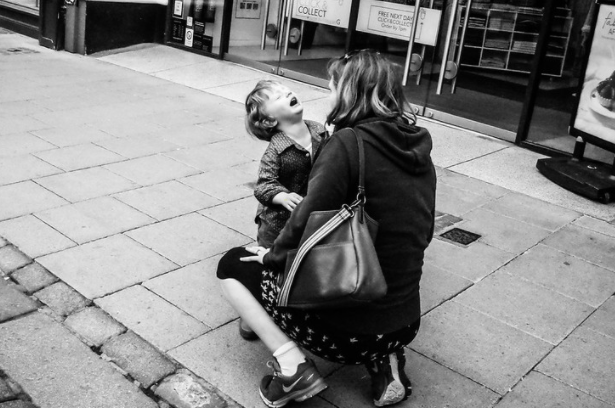Can we please stop telling our children, especially our boys, to stop crying?
Not long ago, I was in a grocery store and heard a little boy crying. He was being held by his dad and coaxed by his mother, who was pushing their youngest son in the trolley.
It sounded as if she was trying to get him on board with the list of errands she was trying to achieve that afternoon (the grocery shop included). He was still whimpering while listening to her.
She finished with, “…But you have to stop crying, okay?”
Please, people, can we not do this?
Can we stop continuing the generational cycle of traumatic, insidious damage done by stifling emotions, particularly, difficult and intensely overwhelming ones?
Of course, the little boy started crying again. Obviously he was still upset and needed to fully feel and release what was going on inside of him. He needed to be heard, honoured, and have space safely held for, while in that state.
To hear disgruntlement from your guardians who are telling you to stop crying feels like utter rejection and a betrayal of your current authentic state.
This sends all the wrong messages to the boy:
I’m not wanted as I am.
I am being disapproved of.
What I’m feeling must be wrong and stopped.
It’s not okay to feel how I feel.
Crying is bad.
Crying is wrong.
There’s a time limit for crying, and only so much is barely tolerated.
That further internalises into:
There are limits on what I’m allowed to express and feel.
I have to force and forge a different mask to cover up what I’m feeling in order to feel that my presence can be acceptable to my family and that I can belong to them again.
There are only certain circumstances that are acceptable to cry for, and for males, this significantly decreases with age.
I don’t want to trust my natural emotional state, instincts, and expressions as they can get me in trouble, and I can become ostracised, humiliated, and belittled for it.
Persistently, the mother tried again to get her son to stop crying, guiding her partner to take him to the front of the store where they could see a toy vending machine. She pointed to it and saying, “See, look out there, there’s a toy machine and we can get you one from there after we finish shopping, but you have to stop crying, okay?”
Please, people, do not bribe/condition our innocent children with things you know they’d love to have but must perform a conflicted and unauthentic act in order to receive it.
He continued to cry for his unmet, raw feelings, and she replied with, “So you don’t want a toy? Are you sure you don’t want a toy?”
More escalated crying followed.
This is such a source of conflict for the poor loves. It’s plain, unfair baiting to get them to succumb to the parents’ desired behavioural mould. By doing this, they are unconsciously repeating outdated and ineffective patterns of child-rearing behaviour.
I could see that the father was internalising massive emotional conflict. So much so that he wasn’t able to utter a word throughout the whole scene. His body language and face were almost bursting with intense strain and upset. I could sense his helplessness and utter frustration. He seemed to be paralysed by his son’s emotional state and the oppositional control that his partner was projecting.
I think he knew that his partner was trying to deal with the situation as best as she knew how to, but was conflicted in his desire to support her. He could clearly see that it was not working and was not in the best interest for their son, despite it conflicting with society’s current expectations of behaviour. Unfortunately, he appeared to not have the initiative or knowledge to apply anything different to this scenario and so submissively followed through with what was occurring.
Really, what is occurring is that the parent is prioritising their compulsive desire to avoid confronting their own heightened emotional state above the intense emotions that their child is currently experiencing, and the support and guidance that their child requires to navigate safely through it.
It is a horrendous thing to feel intense, emotional pain and deep hurt, only to have your genuine expressions of these experiences be met with opposition, ignorance, disapproval, disgust, and willing/passive disengagement by those who are supposed to actively demonstrate their unconditional love, care, loyalty, and support to you, particularly in difficult times that require it the most.
Unfortunately, this is the common narrative for the mass majority of childhoods. I don’t know anyone who hasn’t experienced varying levels of this emotionally stifling, belittling, manipulative behaviour from their parents, carers, and/or authoritative figures.
I get it. It’s so deeply ingrained to want control and immediately stop the source of discomfort we feel, particularly when they are triggered by external factors. Especially, when we haven’t been raised with the skill set necessary to cope with and manage our own emotional terrains.
This becomes harder and more taxing when we are already run-down, pushed to our limits, feeling desperate, overwhelmed, and are trying to keep a tight lid on not exploding ourselves. We may even feel like matching or upping our child’s current emotional state.
I know what it’s like to be in that highly triggered state, where all the sensitivities feel invaded and exploited by a little human’s explosiveness while holding them and having their high-pitched scream borderline-burst my eardrums.
But this doesn’t last for long, because I choose to continue to hold space for my child when she’s in this state. When I can get a word in amongst the screaming and tears, I acknowledge how she feels and state aloud the emotions she may be experiencing (she’s still too young to verbalise them herself). I agree with how she’s feeling and relate to events that were a precursor to this meltdown and how I’d understand why they’d make her feel a certain way.
Once I know she’s felt heard and has heard me, and if she’s finding it difficult to move out of her emotional loop, I move toward shifting her attention to something she enjoys. If she hasn’t gotten it all out of her system and needs more time to express it, then we repeat the same process again.
When she’s able to distance herself from this place and has sufficiently regulated her emotions, a while later, she sometimes initiates the same scenario via role-playing with her toys. This is another opportunity to assure and guide our children through the process of dealing with difficult emotions by validating that they are normal and have every right to feel, express, and learn from them. This creates a narrative where they can observe from an outsider’s perspective on what they (the former insider) had just experienced.
No, this process doesn’t always run as smoothly as it does on paper/on screen. But it is largely what I try to adhere to and remember to fall back upon when I find myself in a place of knee-jerk reactions and see myself slipping back into unconscious parenting patterns.
This appears to be easier to follow through with in a home environment rather than in public or outdoors.
For example, I may prioritise physically moving her and getting us home first (we were a two-minute walk from home, and we had already stopped and started four times) before effectively being able to hold space for her meltdown, for as long she needed. A cold, hard, concrete pavement isn’t the safest place to hold a toddler in physical tantrum mode.
However, if further from home and in public, I know I’d rather witness a parent making the best of their environmental situation and turn toward, connect with, and hold space for their crying child any day over one who is trying to smother their child’s natural expressions and emotional state to avoid dealing with it.
We don’t parent our children to make other people feel comfortable—that’s other people’s own prerogative to deal with. We parent our children to help them feel comfortable in their own sense of self, so they can successfully experience their full range of emotions and be a wholly unrestricted human being.
If we accept them in their genuinely natural state and make space for them to fully feel their emotions, they then tend to dissipate much quicker. By doing this, we are also forging a strong foundation for an unshakeable sense of self-esteem and the ability to self-regulate their emotions as they grow and develop.
We are so fortunate to be in an age and stage where there is an expansive amount of high-quality parenting content and guidance available straight to our devices. There’s really no excuse not to do better than the previous generations before us for the upcoming generations that arrive after us.
But we also don’t miss out. In order to parent better, we first need to parent our own inner child and be for ourselves who we needed when we were younger, vulnerable, and more impressionable. We need to actively heal those deeply set wounds, before becoming the truly conscious parents we want to be and model for our children.
Being stoic and not crying is not admirable, commendable, helpful, healthy, or natural. It’s human to cry; to pretend that we’re anything else than that, or separate from it, is insanity, and what is costing us more than we’d care to confront.
This brutal cost is the loss of lives—that of our own and those who we love—and the saddest thing is, it’s absolutely unnecessary.
However, this message and conditioning can start as early as infancy and tends to significantly increase thereafter.
Can we please change this narrative (especially at this young, vulnerable, and impressionable age) in order to not raise another generation subjected to a lifetime of emotional turmoil, confusion, conflict, detachment, and despair?
Can we please stop telling our children, especially our boys, to stop crying?
In addition to this, can we please also stop using positive reinforcement toward our children as a reward for not crying?
“You didn’t even cry!”
“What a big/good boy/girl you are!”
“You’re so tough and strong (for not crying)!”
“You held it together and didn’t break down. I’m so proud of you.”
Yeah, it takes a lot of conscious mental effort to shift away from regurgitating the commonly used phrases of our childhood, which can happen completely on autopilot. But is it really okay that we’re raising our children without being truly conscious and aware of the implications it has on their psyche?
Is it truly beyond our capacity to steer away from what harms us, even if it’s so familiar, toward what will actually help us, even if it’s so different? I think we can conduct ourselves better than this, and we are more equipped and capable than ever to ensure we don’t let down this next generation.
Let’s share the awareness, face our fears, turn the tide, and watch the next generation flourish inhibition-free before our very eyes, and proudly know we’ve had a major part to play in creating better standards for our human experience.
~


 Share on bsky
Share on bsky





Read 0 comments and reply